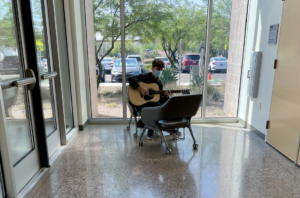High Tech Exec Advocates for High Agency Learning

Marie Bjerede progressed from engineer to high tech general manager because she had great technical skills and the ability to communicate and collaborate (more fully, Tony Wagner’s 7 Cs).
Leading Qualcomm’s Design Center, she studied human motivation and became an early advocate of self organizing teams. In attacking adaptive problems, it was creativity and collaboration that mattered. The most successful engineers didn’t wait to be told what to do, they understood the goals and took initiative.
It’s this sense of agency that Marie thinks will be the most important employment skill. It’s a confidence that one can affect their future and surroundings. It’s the expectation that everyone should be respected.
Having school aged children and reading Disrupting Class peaked Marie’s interest in education and got her thinking about role of technology in learning. For her last few years at Qualcomm, Bjerede led the company’s education efforts.
Since then, Bjerede has consulted with the One to One Institute and COSN. She’s also an active parent of two teenage learners.
In the future of work, everybody will constantly need to prove themselves, said Bjerede. We will all face adaptive challenges, new and different than anything we’ve seen, and agency will be key.
In working with school districts, Marie has observed that most efforts to implement high engagement learning fall short of expectations. She suspects that superficial efforts didn’t involve the necessary mindshift from every adult. “Teachers can’t foster something they’ve never felt,” said Bjerede.
We’ve argued that teachers need to experience personalized learning to deliver it. Marie says the same is true for agentic pedagogy–maker, inquiry, and project-based learning.
In this podcast interview, Marie also talked about building high agency work environments. The alternative to repressive top down or decentralized (you’re on your own) organizations is self organizing teams that take advantage of unique strengths of individuals. Rather than inefficient controls, effective organizations share a clear vision. Rather than charismatic leadership, effective organizations create a culture that embodies distributed leadership, empowerment, teams, and continual improvement.
Key Takeaways:
[:51] Tom welcomes Marie to the podcast and she speaks a bit about her upbringing and what brought her to the States from Sweden.
[1:50] Marie’s current work with organizations on education technology.
[2:25] The story on Marie becoming Qualcomm’s Vice President and the skills it took to get the position.
[4:47] Marie’s perspective on being one of the few female managers and executives in technology.
[5:35] The key to Marie’s development in her career.
[7:21] The genesis of Marie’s interest in human development and education.
[8:34] Preparing young people for the future; Marie’s advice to teenagers as they enter the workforce.
[10:00] The importance of agency today and why it’ll be even more important five years from now.
[15:21] Why high agency learning initiatives can end up not being as successful as hoped and where typical district initiatives launching project-based learning are falling short.
[19:06] Why Marie believes it’s key to first develop teacher agency.
[20:47] Marie’s view on teacher’s focusing on either; remaining devoted to a handful of identified outcomes, or being open to a new set of new possibilities.
[23:05] How Marie describes her ideal high school learning experience.
[25:05] Self-organizing teams: Marie’s alternative to constructing organizations where teachers don’t feel oppressed or abandoned.
[28:00] Marie’s suggestions for how to construct the self-organizing team initiative in a sustainable way.
[32:30] Where to find out more about Marie’s work.
Mentioned in This Episode:
One-to-One Institute
CoSN
Qualcomm
Tony Wagner
P21
Drive: The Surprising Truth About What Motivates Us, by Daniel Pink
AgenticLearning.org
Marie’s Getting Smart Blog Posts
Suggested Reading:
If you enjoyed this conversation and want to learn more, check out:
- “What is Agentic Learning and Why is it Important,” by Marie Bjerede and Michael Gielniak.
- It’s Time for Student Agency to Take Center Stage
- How Schools Develop Student Agency
- 10 Tips for Developing Student Agency
Stay in-the-know with all things EdTech and innovations in learning by signing up to receive the weekly Smart Update.







0 Comments
Leave a Comment
Your email address will not be published. All fields are required.